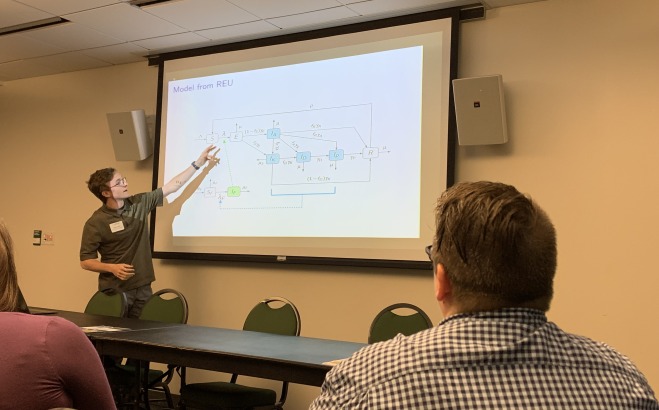
In Short
Career opportunities for mathematics majors increasingly include work related to data analysis, statistical modeling, and data science.
- Develop effective thinking and communication skills
- Learn to link applications and theory
- Learn to use technological tools
- Develop mathematical independence and experience open-ended inquiry
Program Overview
Statistical Modeling focuses on data analysis across a variety of fields and the mathematical foundations of those statistical approaches. Students who complete the concentration in Statistical Modeling will have a strong mathematical background, experience in a variety of data analysis methods, and an emphasis in a second field that further strengthens their statistical or data analysis skills.
Career opportunities for mathematics majors increasingly include work related to data analysis, statistical modeling, and data science. A concentration in Statistical Modeling allows students to focus on developing relevant skills within their mathematics studies, gaining experience with the foundations of statistics, data analysis approaches, and programming for reproducible analysis. Skills developed through the concentration would include wrangling and visualizing data; choosing and building appropriate models for a particular dataset and goal; and thoughtfully approaching ethical questions within data work. The required minor would allow students to either deepen these skills through a minor or to learn the data analysis approaches and thinking of another field.
Required Minor in Another Department
A core aspect in applied math is knowledge of another field. The student must also minor in one of the following areas: computer science, psychology, biology, chemistry, economics, geography/earth science or a minor approved by the Mathematics Department. Note: Many of the courses in the minor can be counted toward the liberal arts and sciences courses.
Experiential Opportunities
Internships
Study Abroad
Curriculum and Other Information
- BA, Statistical Modeling - Program information from the University Catalog.
- BS, Statistical Modeling - Program information from the University Catalog.
- Four-Year Plans of Study - Required and elective courses for program completion.
- Data Scientist: Uses statistical modeling to solve complex problems with large datasets, often focusing on areas like machine learning, predictive analytics, and big data.
- Biostatistician: Applies statistical methods to life sciences and health fields, working on research in public health, medicine, and environmental science.
- Financial Analyst/Quantitative Analyst (Quant): Uses statistical models to analyze market data, assess risk, and develop financial strategies.
- Statistician: A broad role, often in government agencies like the Census Bureau or agricultural departments, where they conduct statistical analysis and report findings.
- Actuary: Uses statistical models to assess and manage financial risks, especially in the insurance and pension industries.
- Market Research Analyst: Analyzes consumer data to identify trends, predict behavior, and help companies with marketing decisions.
- Operations Research Analyst: Uses mathematical modeling to help organizations improve efficiency and decision-making.

